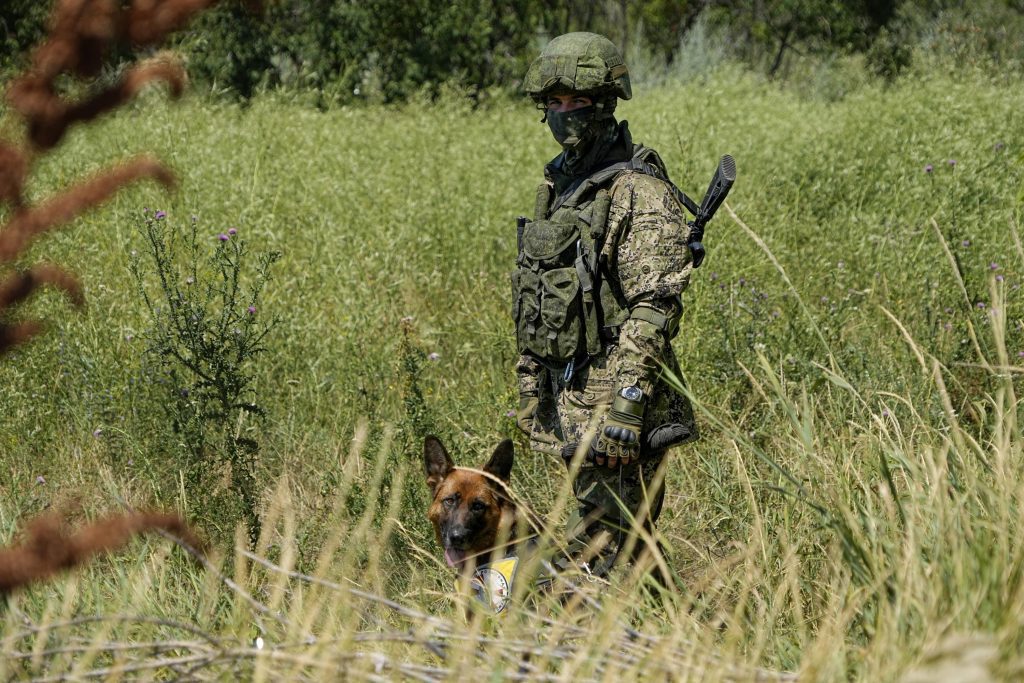
The prisoners in the penal colony in St. Petersburg were expecting the officials’ visit, believing that it would be a kind of inspection. Instead, men in uniform arrived and offered them amnesty – if they agreed to fight alongside the Russian army in Ukraine.
Over the following days, about 12 or so left the prison, according to a woman whose boyfriend is serving a prison sentence there. Speaking on condition of anonymity because she feared reprisals, she said her boyfriend was not among the volunteers, although years into his sentence, he “couldn’t think of it.”
As Russia continues to suffer losses in its invasion of UkraineNow approaching its sixth month, the Kremlin has refused to announce a blanket mobilization — a move that may be very unpopular for President Vladimir Putin. This has instead led to clandestine recruitment efforts that involve the use of prisoners to make up for manpower shortages.
This is also happening amid reports that hundreds of Russian soldiers are refusing to fight and trying to withdraw from the army.
“We are seeing a huge influx of people who want to leave the war zone — those who have served for a long time and those who have recently signed a contract,” said Alexei Tabalov, a lawyer who runs the Law Enforcement School. help group.
Tabalov said in an interview with The Associated Press that the group has seen an influx of requests from men wanting to terminate their contracts, “and I personally have the impression that whoever can escape.” And the Department of Defense is digging deep to find people it can persuade to serve.
Although the Ministry of Defense has denied that any “mobilization activities” have taken place, the authorities appear to be doing their best to boost recruitment. Billboards and public transportation advertisements in various areas proclaim, “This is the job,” urging men to join the professional military. Authorities have set up mobile recruitment centers in some cities, including one at the Siberian half-marathon site in May.
Regional administrations form “voluntary battalions” that are promoted on state television. Business daily Kommersant counted at least 40 of these entities in 20 regions, with volunteer officials promising monthly salaries ranging from the equivalent of $2,150 to nearly $5,500, plus bonuses.
The Associated Press has seen thousands of job vacancies on job search sites for various military professionals.
The British military said this week that Russia has formed a major new ground force called the Army’s Third Corps from “volunteer battalions”, looking for men up to the age of 50 and requiring only a middle school education, while offering “lucrative cash bonuses” once they do. They are published in Ukraine.
But there are also complaints in the media that some are not getting the promised amounts, although these reports cannot be independently verified.
In early August, Tabalov said he began receiving multiple requests for legal assistance from reservists who had been ordered to participate in a two-month training in areas near the border with Ukraine.
Vladimir Usishkin, founder of prisoners’ rights group Gulagu.net, said prisoner recruitment has been going on in recent weeks in up to seven regions, citing colleagues and relatives his group has contacted.
This is not the first time that the authorities have used such a tactic, as the Soviet Union employed “prisoner battalions” during World War II.
Nor is Russia alone. Early in the war, Ukrainian President Volodymyr Zelensky promised to pardon veterans behind bars if they volunteered to fight, though it remains unclear whether anything came of it.
Osichkin said that in the current circumstances, it was not the Ministry of Defense that was recruiting prisoners – instead, it was Russia’s shadowy special military force, the Wagner Group..
Yevgeny Prigozhin, a businessman known as “Putin’s chef” because of his catering contracts with the Kremlin and Wagner’s manager and financier, ignored reports that he personally visited prisons to recruit convicts, in a written statement issued by his representatives this month. Prigozhin, in fact, denies having any ties to Wagner, who is said to have sent military contractors to places like Syria and sub-Saharan Africa.
According to Usshkin, prisoners with military or law enforcement experience were initially offered to go to Ukraine, but this was later expanded to include inmates of different backgrounds. He estimated that as of late July, about 1,500 people may have come forward, seduced by promises of large salaries and an eventual amnesty.
Now, he added, many of these volunteers – or their families – are calling him and seeking to give up their commitments, telling him, “I really don’t want to go.”
According to the woman whose boyfriend is serving his sentence in the penal colony in Saint Petersburg, offers to leave prison are a “ray of hope” for freedom. But she said he told her that of the 11 volunteers, eight had died in Ukraine. She added that one of the volunteers regretted his decision and did not believe he would return alive.
Her account cannot be independently verified, but it aligns with multiple reports by independent Russian media and human rights groups.
According to those groups and military lawyers, some soldiers and law enforcement officers have refused to deploy to Ukraine or are trying to return home after weeks or months of fighting.
Media reports of some troops refusing to fight in Ukraine began to surface in the spring, but rights groups and lawyers only started talking about the number of refusals, which reached into the hundreds last month.
In mid-July, the Free Buryatia Foundation reported that about 150 men managed to terminate their contracts with the Ministry of Defense and returned from Ukraine to Buryatia, a region in eastern Siberia on the border with Mongolia.
Some soldiers face repercussions. Tabalov, a legal aid attorney, said about 80 other soldiers who sought to have their contracts rescinded were detained in the Russian-controlled town of Bryanka in eastern Ukraine’s Luhansk region, according to their relatives. He said last week that Priyanka’s detention center had closed due to media attention.
But the father of one officer who was arrested after trying to get out of his contract told The Associated Press this week that some are still being held elsewhere in the area. The parent requested anonymity due to safety concerns.
Tabalov said a soldier could terminate his contract for a compelling reason—usually not difficult—although the decision is usually up to his commander. But he added, “Under the conditions of combat, not a single commander would admit such a thing, because they would find people to fight?”
Alexandra Garmashapova, president of the Free Buryatia Foundation, told the AP that soldiers and their relatives are complaining that commanders are tearing up termination notices and threatening “rejectionists” with prosecution. As of late July, the foundation said it had received hundreds of applications from soldiers seeking to terminate their contracts.
“I receive letters every day,” Garmashapova said.
Tabalov said that some soldiers complain that they were deceived about where to go and did not expect to end up in a war zone, while others are tired of fighting and unable to carry on.
The lawyer said they rarely, if any, appeared to have been motivated by anti-war convictions.
Military analyst Michael Kaufman said that Russia will continue to have problems with soldiers refusing to fight, but that Russia’s ability to “tamper … with half-measures” should not be underestimated.
“They’re going to have a lot of people who quit or have people who don’t want to spread,” Kaufman, director of the Virginia-based Russian Studies Program at the Center for Naval Analytics, said in a recent podcast. . They used a lot of measures to try to keep people in line. But in the end, there’s not much they can do.”
___
Follow the AP’s coverage of the war in Ukraine at https://apnews.com/hub/russia-ukraine





More Stories
Jasper Fire: Latest map after wildfires erupt in Jasper National Park, Alberta
SNCF: French high-speed trains disrupted by ‘coordinated sabotage’ ahead of Paris Olympics opening ceremony
Macron Responds to Left-Wing Efforts to Rule France – Politico